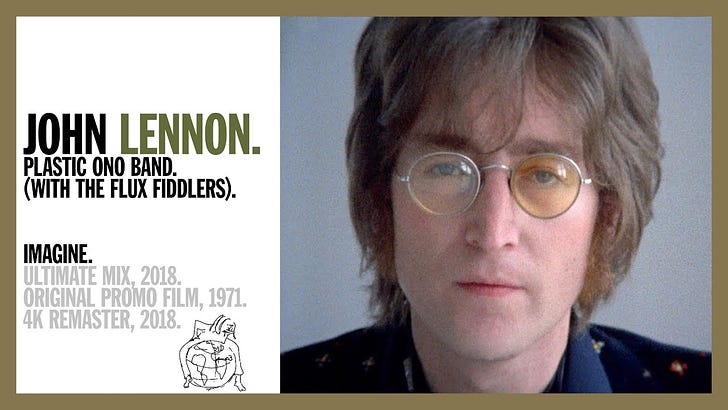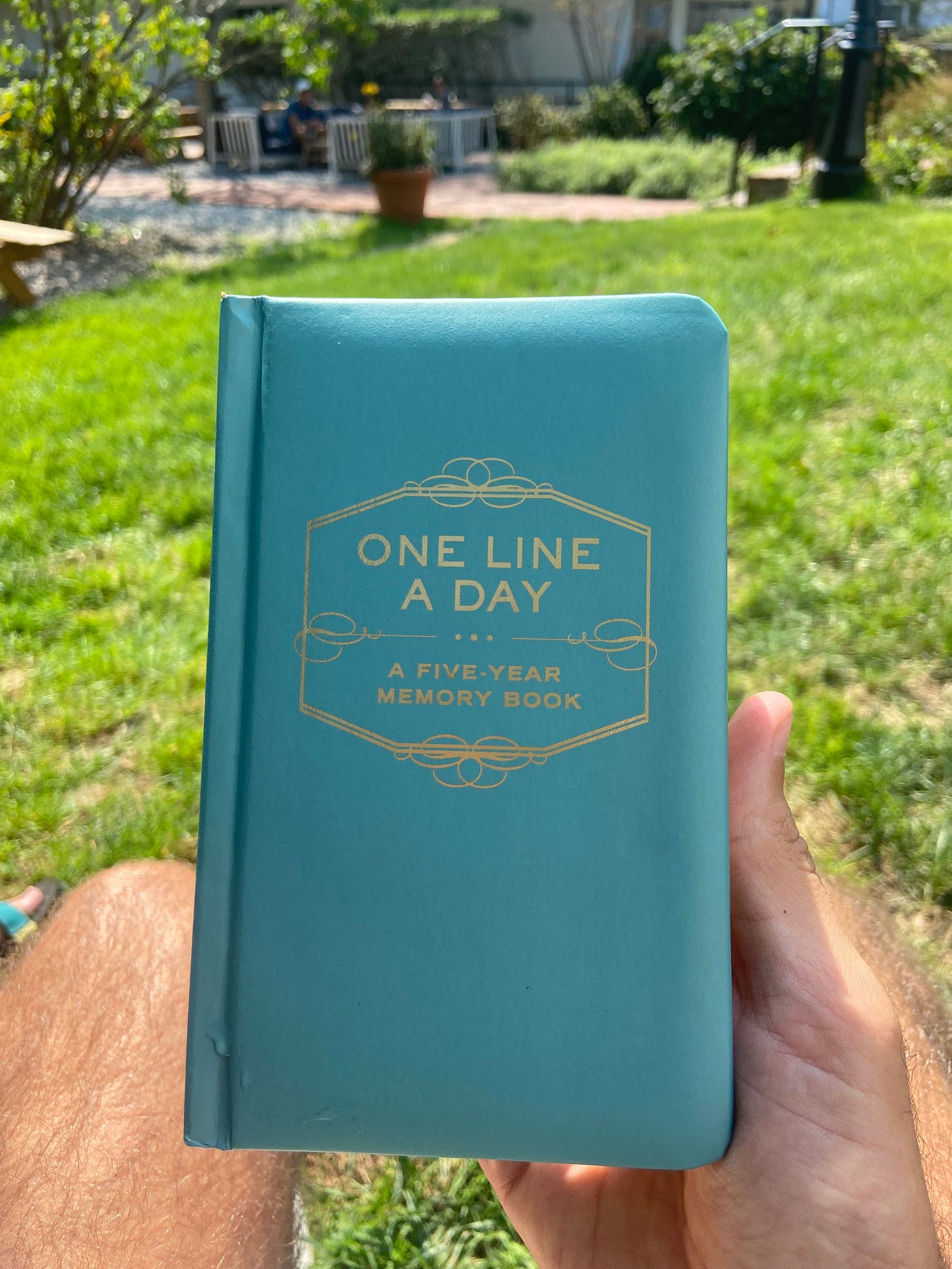Hello friends,
I wish you and your loved ones much peace here this late September day. Autumn has arrived in our part of the world, and another summer has passed. Where did the time go?
Our relationship with time is adversarial for many of us: It goes by fast, maybe too fast, and we feel we never have enough time to do what we want. I often think this way, heading to bed to write in my journal or take inventory of the day’s events, only to realize how rapidly the days are passing by. It seems to be a human thing to long for the past or certain aspects of it, while looking forward to a better life in the future.
This brings me to a memory from nearly 20 years ago. In first grade, a friend and I played kickball after school, and we walked to the water fountain for a drink. As we passed a custodian, I told my friend, "I can't wait until we are all grown up!" He agreed, saying something about how fun adult life would be.
The custodian turned around without hesitation and said something to the effect of, "No, you don't. Enjoy having fun and being a kid."
It was 2004, and over the past couple of weeks, I have been thinking about that interaction. It resonated with me then and resonates with me now, especially when thinking about our relationship with time. Sometimes, we yearn for a better future with more autonomy, money, health, success, or freedom — whatever it may be. In doing so, we might neglect to realize the true power and beauty of the current day. “Don’t wish your life away” applies to the first-grade me, and it’s worth considering whenever we (naturally) look forward to the future. Just as it is natural to want to be young again, our future selves may long for this chapter of our lives, too.
Marcus Aurelius said that we have the precious privilege of breathing, thinking, feeling, creating, and loving. Acknowledging these tremendous gifts can be empowering. One day, today will probably be viewed as the good old days. As James Clear notes:
“Whatever age you are today, your future self would love to be it. Most people do not consider 65 to be a young age... but when you're 75, you'd love to rewind to 65 and regain those years. Few people would describe 35 as your youth, but in your mid-50s your mid-30s will seem like the "young you."
Today is a great opportunity, no matter your age. Looking back in a few years, today will seem like the time when you were young and full of potential or the moment when you could have started early, or the turning point when you made a choice that benefited your future.”
The truth is that each day is a gift for us on Earth, and time is our most valuable resource. We can acquire more physical goods, but we cannot buy back time. Sometimes, we wish we had more time, yet we scroll on social media for hours or talk about others or complain about things out of our control. Here’ Stoic philosopher Seneca, about 2,000 years ago:
“No person hands out their money to passersby, but to how many do each of us hand out our lives! We’re tightfisted with property and money, yet think too little of wasting time, the one thing about which we should all be the toughest misers.”
For years, I’ve tried to “add” time to my life through reduction. I’ve cut out TV almost entirely from my life to free up time. I’ve deleted many apps, including social media apps, and I only join meetings if I absolutely must. I read that Tim Ferriss doesn’t check email on his cell phone, and many people have found that checking their phone only once every hour or two helps them get more done in less time. (On average, Americans check their phones 344 times per day, or once every four minutes.) The last one is perhaps the most effective trick. When I work or focus with my phone in another room, efficiency skyrockets, and there’s more time leftover.
***
I spent part of my Sunday considering how quickly life to be passing by, such as that interaction with the custodian, a memory that remains crisp in my mind. One strategy that has helped slow down my perception of time is experiencing details of life as if it were my first time seeing them. Driving by familiar places, for example, or pouring a cup of tea in the morning — it's all familiar when we're on autopilot, a default for many of us. But when we practice the art of noticing, we have a chance — at least a glimmer of hope — to slow down our perception of time, be with these moments, and feel them more clearly.
Other times, I imagine I will die in a year, a process that shifts my relationship with time. Time becomes more fleeting to me, and I tend to live more intentionally. Recognizing the fleetingness of time/life can bring one to the present.
Similarly, the writer George Saunders recalled how he felt more alive in a near-plane crash years ago when the plane landed safely.
“For three or four days after that,” Saunders said, “it was the most beautiful world. To have gotten back in it, you know? And I thought, '"If you could walk around like that all the time, to have that awareness that it’s actually going to end. That’s the trick.”
As I jotted down in my journal the other day, the goalposts in life keep moving. When we achieve our desired goal, chances are, we soon redirect to a new one. This is the arrival fallacy. Lasting fulfillment, joy, or happiness is unlikely to happen in the future when we think “I just need XYZ” to be at peace.
The activities I find most comforting are sitting with my journal, going for a walk in the park, and simply being. I refuse to be guilted into looking busy or productive just to fit societal norms.
What has helped you improve your relationship with time or understand it more clearly? I’d love to hear.
The other day, people were asked about someone whose communication skills they admired. Most people responded that they admired an articulate speaker. But the answer that stood out to me was from the person who talked about an old leader whose listening skills were off the charts. It served as a reminder that listening is a part of communication, a powerful tool, and one that is often overlooked. In many ways, listening — giving others our full attention — is the greatest gift we can offer.
John Lennon’s masterpiece, “Imagine,” asks the listener, among other things, to "imagine no possessions." Here’s Lennon and his wife, Yoko, 50 years ago, in an interview with The New Yorker":
John: I wish Imagine would come true. I've been listening to it myself because I get an objective view after, and I was imagining. I began to think: I don't want that big house we built for ourselves in England. I don't want the bother of owning all these big houses and big cars, even though our company, Apple, pays for it all. All structures and buildings and everything I own will be dissolved and got rid of. I'll cash in my chips, and anything that's left I’ll make the best use of.
Yoko: There is a kind of poverty when you have an excess in things, and all your energy is directed toward getting and keeping them. I like the idea of everything being transient, so that all that is with me is somebody I love and myself.
Last week, in Sarasota Magazine, I wrote about the health benefits of dogs. Here is the piece, and here is a preview:
It’s no secret that these pets give us a sense of belonging and meaning. Dogs love unconditionally. They don’t hold grudges, and they offer love and support upon which we come to rely. Studies have shown that dog owners have lower blood pressure and cholesterol, and a lower resting heart rate than non-owners. While the pandemic exacerbated loneliness in the U.S., and rates of political division and burnout have climbed, pets can ease our tension and improve our well-being.
“Owning a pet keeps you active and gives you a sense of purpose,” says David Lynch, the senior director of operations at The Humane Society of Sarasota County. “You get out in fresh air. You stay healthy. The first thing that happens every day is my dogs wake me up to go for a walk. Then I come home to my dogs and their unconditional love. When you are down, a support system is right there.”
Lastly, a little kindness, hopefully, that we can pass on…
Ally and I were eating at a busy breakfast restaurant this summer, and, like many places, it was short-staffed. Servers were overwhelmed, and people were growing frustrated. As we sat down, a waitress told the couple next to us that a recent party had vacated the table without paying for the food. Earlier, the same people had complained about her service, then relayed the message to her manager, telling him something like, “she’s the worst waitress in the country,” according to the waitress. She said she had broken down because of these interactions and asked to leave work early and go home. She was emotionally taxed. “People have been so mean to me,” she told the couple.
Before she walked away, the people next to us reassured her. They said they thought her service was good, and they reminded her it wasn’t her fault that the kitchen was backed up or that the restaurant was short-staffed. They complimented her service with genuineness in their voice, and that genuineness has stayed with me several weeks later. I will not forget that small but meaningful act of human supporting fellow human.
Photo of the week: I have begun a one-line-a-day journal where I’ll jot down a few thoughts at the end of each day for the next five years. It’s a classic memory-keeper, a way to track the ups and downs of life, day by day.
Celebrate your gifts,
Matthew



